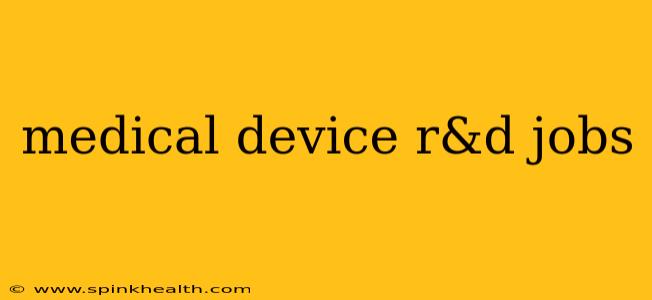Charting a Course in Medical Device R&D: A Journey into Innovation
The world of medical device research and development (R&D) isn't just about building gadgets; it's about crafting life-altering solutions. It's a thrilling blend of engineering ingenuity, scientific rigor, and a deep-seated commitment to improving human health. If you're drawn to this field, you're likely curious about the diverse roles available and the path to securing a fulfilling career. Let's embark on a journey to explore the exciting landscape of medical device R&D jobs.
What are the different types of medical device R&D jobs?
The beauty of medical device R&D lies in its diversity. It's not a single career path, but rather a vast network of interconnected roles, each crucial to the overall success of bringing a new device to market. You might find yourself working as a:
-
Biomedical Engineer: These are the architects of medical devices. They design, test, and refine the devices themselves, applying principles of engineering, biology, and medicine. Their expertise ranges from creating implantable sensors to designing advanced surgical tools.
-
Software Engineer: With the increasing sophistication of medical devices, software is becoming an integral part of their functionality. Software engineers ensure that the embedded software is reliable, efficient, and secure. This could involve developing algorithms for image processing, user interfaces, or data analysis.
-
Regulatory Affairs Specialist: Navigating the complex landscape of regulatory approvals is crucial. Regulatory affairs specialists ensure that devices meet all the necessary safety and efficacy standards, guiding them through the FDA approval process or equivalent international regulations.
-
Clinical Research Associate (CRA): These professionals are the bridge between the lab and the clinic. They oversee clinical trials, ensuring that studies are conducted ethically and according to strict protocols, collecting crucial data to demonstrate the device's effectiveness.
-
Project Manager: Medical device development is a complex undertaking involving numerous teams and timelines. Project managers oversee the entire process, ensuring projects stay on track, within budget, and deliver on their promises.
What skills are needed for a medical device R&D job?
Success in medical device R&D demands a unique blend of hard and soft skills. While a strong educational foundation is essential (often a bachelor's or master's degree in engineering, biology, or a related field), it's the combination of technical expertise and collaborative abilities that truly sets professionals apart. Here are some key skills:
-
Technical Proficiency: A deep understanding of engineering principles, materials science, and relevant biological systems is fundamental. Specific expertise will vary depending on the role.
-
Problem-Solving Skills: Medical device development is rife with challenges. The ability to identify, analyze, and resolve problems creatively and efficiently is crucial.
-
Collaboration and Communication: R&D is a team effort. Strong communication and collaboration skills are vital for working effectively with engineers, scientists, clinicians, and regulatory bodies.
-
Analytical Skills: Analyzing data from experiments, simulations, and clinical trials is a cornerstone of the process. Proficiency in data analysis techniques is essential.
-
Regulatory Knowledge: Familiarity with FDA regulations (or equivalent international regulations) is highly valuable, particularly for roles involving regulatory affairs.
What is the job outlook for medical device R&D?
The outlook for medical device R&D jobs is exceptionally positive. The aging global population, coupled with ongoing advancements in medical technology, is driving significant growth in this sector. The demand for skilled professionals across all R&D roles is expected to remain strong for years to come.
What education and experience are needed for medical device R&D jobs?
While entry-level positions might be accessible with a bachelor's degree, a master's degree or PhD is often preferred, especially for more senior roles. Relevant internships and research experience are invaluable in building your resume and demonstrating your skills.
How can I find medical device R&D jobs?
Networking is key! Attend industry conferences, connect with professionals on LinkedIn, and explore job boards specializing in the medical device sector. Company websites and university career services are also excellent resources.
The field of medical device R&D is a rewarding and impactful career path. If you're passionate about innovation and improving lives, it's a journey well worth exploring. The challenges are significant, but the rewards—in both professional satisfaction and contributions to global health—are immeasurable.

